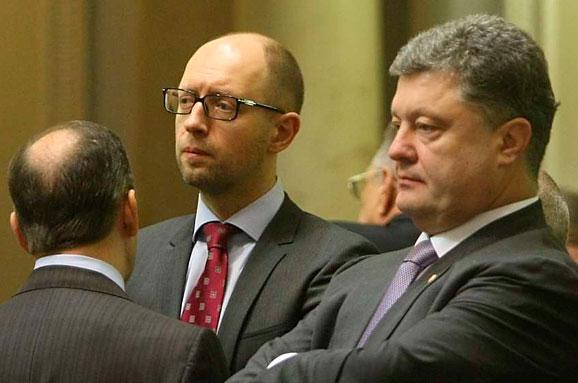According to the results of today's voting in the Verkhovna Rada, two coalitions have been formed: the coalition to preserve the (current) parliament and the coalition for early elections. The first coalition includes the Bloc of Petro Porosheko (BPP) and the People's Front. Both political forces want to keep the parliament simply because they currently have no hope of repeating the results they had obtained in the previous elections. And it is unclear who has the more direct road to nowhere -- Arseniy Yatseniuk and his associates, who may end up out of the parliament altogether or else as members of a tiny faction, or Petro Poroshenko, who risks becoming a president without a faction, and therefore without power.
After all, the example of Viktor Yushchenko is very revealing for the president. The second coalition is not even the opposition. It is simply a coalition for early elections. Today its members are not thinking about the government's efficiency or lack of efficiency but strictly about how to bring about those elections.
Batkivshchyna (Fatherland), Samopomich (Selfreliance), the Opposition Bloc, and the radicals have united in this coalition, along with a portion of BPP who are counting on getting into parliament with the help of the Saakashvili brand if early elections are held.
Each one of these political forces could be a winner in early elections. Yulia Tymoshenko, additionally, can hope that early elections for the Verkhovna Rada will be a prelude to early elections for president, when the Batkivshchyna leader could take revenge for defeats in 2010 and 2014.
Thus, Tymoshenko may begin negotiations with several potential partners almost immediately, promising each one the post of prime minister in exchange for support for her presidential ambitions. For Saakashvili and, to a lesser extent, for Sadovyi this may be an attractive partnership.
Afterwards, certain nuances could change this picture dramatically. As the ratings of the People's Front grow and those of the BPP fall -- these are almost inevitable processes after the formation of Groysman's government -- the People's Front may move from the coalition for the preservation of parliament to the coalition for early elections with the goal of recapturing the level of influence lost after Yatseniuk's resignation.
Moreover, one or two parties of the "early elections" group, whose ratings may begin to drop, may either be brought into the coalition for retaining the parliament -- therefore the ruling coalition -- to prevent the People's Front faction from threatening the president with withdrawal from the coalition.
But in the president's behavior there are certain features not immediately visible t o the naked eye.
The crux of the matter is that the president is not the BPP, and the history of Volodymyr Groysman's appointment has proven that once again. The president is the president and he can rely on different political forces, which may present themselves as the opposition but which may, in fact, be the cover for his own influence.
In early elections Poroshenko may no longer place his bet on the BPP but on Saakashvili's project -- therefore he himself may move from supporting the party branded as the "party of the nomenklatura" (ruling class -- Ed.) to supporting the "party of the true reformers," which will ensure his interests in the new parliament.
To ascertain the probability of the new plan's implementation it will be necessary to observe the behavior of Saakashvili and his allies. If the former president of Georgia begins to harshly criticize BPP and the government while bypassing the president and (just in case) the new prime minister, this will indicate that Poroshenko has developed a backup plan.
And this means that the president -- as paradoxical as it may appear -- has one foot in the coalition for preserving the parliament, together with his BPP associates, and the other in the coalition for early elections, together with his other BPP associates and the potential " Saakashvili team."
And that is why he can say with a clear conscience that he is reaching out to both parts of the parliament. It is easy to reach out when one has created the foundations. This position is quite difficult for the president, of course, and it is not clear how long he can survive in such an unusual situation. But it is a game.
As long as the interests of the head of state coincide with the interests of both coalitions and they do not realize it, the president will benefit from the actions of each coalition and thus remain invulnerable to the attacks of opponents.



